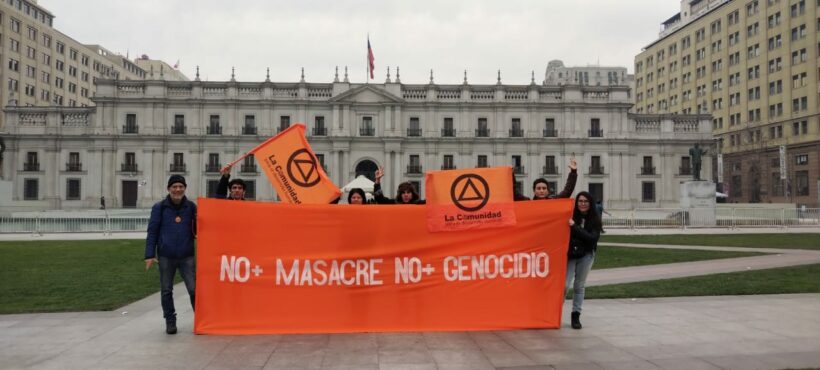Mr.
Gabriel Boric Font
President of the Republic of Chile
Dear Mr. Gabriel Boric Font President of the Republic of Chile
Dear Mr. President
78 years ago, on 6 August, in the context of the Second World War, the United States of America decided to carry out an act of mass destruction against civilians, dropping the atomic bomb on the Japanese city of Hiroshima, which in its first impact killed 140 000 citizens and, in the following months, hundreds of thousands more as a result of the devastating effects of the radiation. Three days later, on 9 August like today, a second bomb was dropped on the Japanese city of Nagasaki, initially killing 74,000 civilians. This terrorist action not only forces Japan’s surrender, but ushers in a new epoch in human history, the era of the Nuclear Threat.
It took 25 years for the post-war generation to emerge publicly, as citizen opposition to this new situation of insecurity for the survival of the planet, with its first actions of denunciation and awareness-raising in the 1970s, and since then it has been growing and acting decisively all over the world.
In the mid-1980s, the Chernobyl tragedy raised awareness of the dangers of nuclear power plants, especially in Europe. Finnish women pledged not to become pregnant until their government took a different path to nuclear power, and succeeded. Many governments on that continent, under public pressure, are planning to dismantle and change direction in the energy sector over the next three decades.
The ecological consciousness of the younger generation revealed the dangers of handling the toxic waste resulting from nuclear manipulation.
The Perestroika movement in the former Soviet Union at the end of the 1980s managed, through political action, to halt the nuclear arms race, which had the survival of the entire planet on the line, in its veiled confrontation with the United States, known as the Cold War.
In this new millennium, 2009 saw the first World March for Peace and Nonviolence, called by all the humanists of the world, which travelled around the planet calling for the dismantling of the world’s nuclear arsenal, among other measures that would allow the continuity of human history in the world. Ordinary citizens, as well as personalities from all areas of human endeavour, are demonstrating their support for this initiative.
Two years later, Japan declares a nuclear alert after a reactor explosion at the Fukushima nuclear power plant in March, following the damage caused by the tsunami that hit the country. Shortly after, Germany, Italy and Switzerland plan to decommission and change energy direction for the coming decades.
The Treaty on the Prohibition of Nuclear Weapons held its first Meeting of States Parties in Vienna from 21 to 13 June 2022 with the participation of 49 States Parties, 34 observer States and representatives of the United Nations, international and regional organisations, the International Committee of the Red Cross and civil society. The Second Meeting of States Parties will take place the week of 27 November to 1 December 2023 at UN Headquarters in New York, with Mexico as Chairperson.
The beginning of the Russian invasion of Ukraine, the first war on European territory in many decades, and the permanent measures of economic coercion dictated by NATO to the European and American parliaments against the Russian Federation have brought “collateral” socio-economic and environmental effects, which are suffered by people all over the world. Russia and NATO together have the world’s largest nuclear arsenal.
CELAC has a general position prior to this war in Europe. This position is in favour of resolving conflicts through diplomacy, and in cases of unleashed war (as in this one), its position is foreseen: to repudiate the war and immediately assume the position of neutrality, from which a politically negotiated solution to the conflict can be promoted without arbitrariness. The breaking of this neutrality agreement, with the statements you made, aligning yourself with the Western position, taking sides with Ukraine and the NATO narrative, is what we are asking you to reconsider today.
Beyond the fact that the actions of both sides are unacceptable, both the Russian invasion and the breaking of the agreements made in the White House with Gorbachev that NATO would not add countries to Eastern Europe, we agree with what the President of Brazil, Lula da Silva, said at the CELAC summit, “now it is no use saying who is right, who is wrong. What we have to do now is to stop the war”.
With marches and counter-marches, the global citizens’ clamour, embodied in the anti-nuclear movements and in many conscious social organisations, has become clear and categorical. And today, 78 years after the massacre in Hiroshima and Nagasaki, we encourage you to join the Chilean government in the following urgent appeal in the European war conflict: Ceasefire and diplomatic solution NOW!
Javiera Garcés Gatica, President.
The Community for Human Development.






